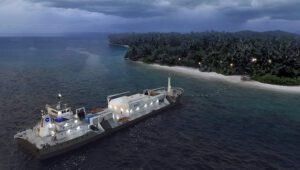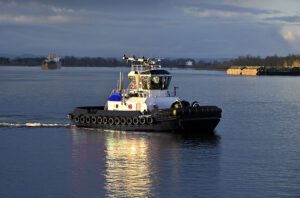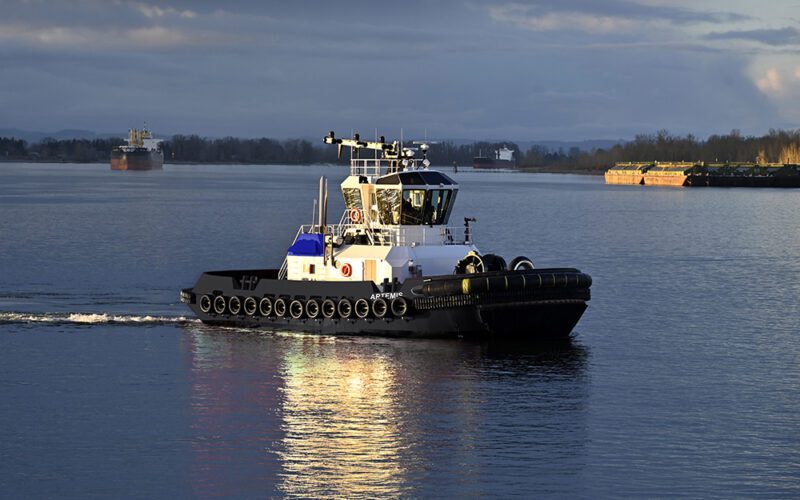From rescuing vessels in distress to moving millions of tons of cargo, the tugboat, tow boat and barge industry on the West Coast has been bustling with business activity in recent years, a trend that doesn’t appear be easing anytime soon.
To prepare for that demand, West Coast towing companies have been investing in
new vessels and equipment, many of them built with sustainability in mind, and grow
the workforce.
Here’s a look at what various coastal ocean and coastal towing companies are doing in the region and beyond.

Image: Crowley Maritime.
Crowley
Crowley Maritime has experienced growth over the last 12 months, including a partnership with BWX Technologies to develop a nuclear power generation vessel concept as well as plans to provide the first-ever liquified natural gas (LNG) bunkering services on the Pacific side of the Panama Canal.
Crowley also announced in September a joint venture with SEACOR Marine called Fairwater Holdings LLC integrating liquid energy and chemical transportation vessels, operations and related services.
Fairwater is expected to serve the U.S. domestic market with vessels and marine transportation solutions across petroleum and chemical trades, as well as related third-party ship management services.
The joint venture encompasses 20 ocean-going tug-barges and 11 tankers, many under long-term charter, and is expected to close in the first quarter of 2024, Crowley Shipping Vice President Paul Manzi said.
As Crowley grows its business, Manzi said, sustainability is expected to be an ongoing priority for the company, which is working on laying the groundwork for decarbonization. The company has incorporated sustainability into its strategic plan with a target of achieving net-zero emissions by 2050.
The company also has been testing biofuels in its vessels, transitioning part of its fleet to renewable diesel, developing all-electric tugboat eWolf and launching Crowley Wind Services.
“Crowley’s direction for the coming years involves a persistent pursuit of sustainability, innovation and resilience,” Manzi said.
“The company’s commitment to its people, decarbonization efforts and transformation for the future demonstrates its dedication to being a leader in the maritime and logistics industry, with a focus on serving its customers and protecting the environment,” he added.

In past years, Crowley has added several long-term Tier IV tugboat charters to its fleet of ship-assist and harbor tug services for West Coast ports, including state-of-the-art vessels such as Hercules, Apollo, Athena and Artemis.
And in 2024, the company is expected to deliver eWolf, the nation’s first fully electric ship- assist tug, which is set to begin operations at the Port of San Diego.
Crowley also anticipates launching a new U.S.-built LNG bunker barge, which would help expand current network capacity and meet cleaner energy demands, Manzi said.
In 2025, Crowley expects to start operating four LNG-fueled containership new builds to support its U.S.-Central America trade. Operating under a long-term time charter to Crowley, the ships will expand the company’s fleet and supply-chain capabilities linking U.S. markets to Nicaragua, Honduras, Guatemala and El Salvador.
The company also has said that it’s moving forward on its strategies to lower emissions by modernizing its ports through electrification, right-sizing facilities, investing in alternative fuel equipment and building renewable energy capacity.
In other company news, James Fowler in September was named senior vice president and general manager of Crowley Engineering Services and Crowley Shipping.
“He brings a wealth of experience and industry leadership and is responsible for leading our shipping business unit, advancing our maritime services and sustainable solutions around the world,” Manzi said.
Haisea Marine
Canada’s HaiSea Marine, a joint venture owned by the Haisla Nation indigenous people with Seaspan ULC, is adding to its green fleet. In July, it introduced the HaiSea Wamis, the first of three fully electric tugboats to operate in the Northern British Columbia harbor.
The tug features 5288 kWh of total battery capacity, enough to operate about 70 Tesla vehicles throughout the day, according to the joint venture.
When delivered, the fleet is expected to head to its future base in Kitimat, where it is expected to offer ship-assist and escort towing services to LNG carriers coming to the new LNG Canada export facility in Haisla Nation territory.
To prepare for the fleet’s arrival, HaiSea Marine hired Pacific Marine Construction to build a floating tugboat maintenance facility. Officials in June celebrated the concrete pour for the project, which calls for two main areas with a large workshop, common spaces and a gym facility that would accommodate eight shore-based personnel, according to HaiSea Marine.
“We are (honored) to build a facility that will embody the values of both Haisla Nation and Seaspan and reflect their true partnership,” Pacific Marine Construction President Cory Handyside said. “It will also showcase an innovative design as a floating facility which is required due to the extreme tidal range experienced in the Kitimat region.”
Western Towboat
The 75-year-old family-owned company, which runs a fleet of tugs and barges from Puget Sound to the Aleutian Islands and from Arctic Alaska to the Hawaiian Islands and the Panama Canal, has been bustling with activity.
Western Towboat, based in Seattle, wrapped up a months-long series of seven trips to the Arctic this past summer for Alaska Marine Lines. They headed to Red Dog Mine, hauling over 80,000 tons of cargo, the most Western has ever done with AML.
“It’s all various equipment for the mine to operate during the winter because it’s cut off from pretty much the outside world during the winter months here because it freezes over all the way up there in the Arctic,” Western Towboat’s Russell Shrewsbury said. “So, we bring in all the supplies that they need for operating, whether it be trucks (or) heavy equipment.”
Meanwhile, Western Towboat is actively hiring for crew members. One of the biggest challenges among towing companies, Shrewsbury said, is finding the right people.
“You can have all the boats you want, but if you don’t have the people to run them, it doesn’t do anybody much good,” he said. “We’ve been pretty lucky to have good people. But it’s been a struggle for a lot of (companies) to come up with the right people around all this equipment.”
Foss
The crew members and tugs of Foss Maritime—part of Seattle-based Saltchuk Marine—have been working on various projects over the last 18 months.
Foss was recently involved in towing the former USS Kitty Hawk aircraft carrier 16,350 miles from the Puget Sound Naval Shipyard in Bremerton, Wash. to Brownsville, Texas.
Blair Teddy, senior oceans port captain for Foss, spoke to Pacific Maritime about the scope of the project, which involved a 114-day journey using a single ocean tug with a 100 MT Bollard pull, the Michele Foss, with escort assists from its berth by tugs Lindsey Foss, Henry Foss, Wedell Foss and Bo Brusco.
Because the air carrier was too big to move through the Panama Canal, Foss had to devise a logistics plan that went through the Straits of Magellan, building in port stops for fueling, crew changes and supplies.
The crew of the Michele Foss also had to deal with heavy seas and gale force winds as they rounded South America.
“There’s a lot that went into it,” Teddy said, adding that the risk assessment process applied to this project will serve as a template for how Foss approaches subsequent projects.
In late December, Foss accomplished back-to-back rescue tows in a single day in rough sea conditions. The first vessel in distress was heading to Asia when it experienced mechanical and steering propulsion issues. The Denise Foss was dispatched to the rescue tow.
Then Foss received a second call of a cargo ship with broken rudder shafts that lost maneuverability. The company dispatched the Lauren Foss. Both vessels in distress were towed back to the Washington coast.
“We were in close communications with both boats,” Teddy said, “so everybody was okay, and everything was safe.”
KAREN ROBES MEEKS, a Southern California native, is an award-winning journalist with more than 20 years’ writing experience. Her articles have appeared in the Los Angeles Times, San Francisco Chronicle, Orange County Register and Long Beach Press-Telegram, where she worked as a reporter for nearly 14 years. Her work has been recognized by the California News Publishers Association, the Associated Press News Executives Council and the Los Angeles Press Club.

